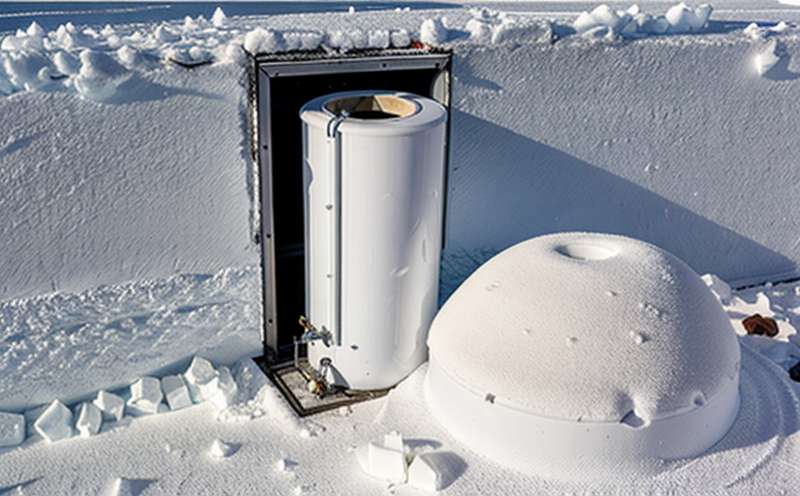Testing the performance of thermal insulation materials under freeze-thaw conditions
Unlocking the Secrets of Thermal Insulation Materials Testing Performance Under Freeze-Thaw Conditions
As the world becomes increasingly aware of the importance of energy efficiency and sustainability, thermal insulation materials have become a crucial component in building design and construction. However, these materials are not immune to environmental factors that can affect their performance. One such factor is freeze-thaw cycles, which can compromise the integrity and effectiveness of thermal insulation. To ensure the longevity and reliability of these materials, its essential to test their performance under freeze-thaw conditions.
At Eurolab, we offer a comprehensive laboratory service designed to evaluate the behavior of thermal insulation materials when exposed to repeated freeze-thaw cycles. This critical testing enables manufacturers, designers, and builders to identify potential issues before they become major problems on-site.
Why Test Thermal Insulation Materials Under Freeze-Thaw Conditions?
The importance of testing thermal insulation materials under freeze-thaw conditions cannot be overstated
Enhances durability Freeze-thaw cycles can cause thermal insulation materials to degrade over time, compromising their ability to retain heat. Testing ensures that these products can withstand the rigors of environmental changes.
Improves performance By understanding how thermal insulation materials respond to freeze-thaw cycles, manufacturers and designers can optimize product design, leading to improved performance and energy efficiency.
Reduces maintenance costs Identifying potential issues before they occur minimizes the need for costly repairs or replacements, ensuring that buildings remain safe and operational throughout their lifespan.
Supports regulatory compliance Many countries have regulations requiring building materials to meet specific standards related to thermal insulation. Our testing service helps ensure that products comply with these requirements.
Key Benefits of Testing Thermal Insulation Materials Under Freeze-Thaw Conditions
Predictive maintenance By identifying potential weaknesses, our testing enables businesses to plan for necessary repairs or replacements, minimizing downtime and costs.
Product optimization Manufacturers can refine their product design based on the insights gained from our testing, resulting in improved performance and energy efficiency.
Increased customer confidence Our testing provides assurance that thermal insulation materials meet the required standards, enhancing trust with clients and stakeholders.
Reduced liability By conducting thorough testing, businesses can mitigate potential risks associated with product failure or inadequate performance.
Frequently Asked Questions (FAQs)
Q What is freeze-thaw cycling?
A Freeze-thaw cycling refers to the repeated process of freezing and thawing of water within a material. This can cause expansion and contraction, leading to damage or degradation over time.
Q How does Eurolabs testing service work?
A Our expert technicians conduct a series of controlled freeze-thaw cycles on thermal insulation materials in our state-of-the-art laboratory facilities. We evaluate the effects of these cycles on material integrity, performance, and durability.
Q Why is it essential to test thermal insulation materials under freeze-thaw conditions?
A Freezing and thawing can compromise the effectiveness and longevity of thermal insulation materials. Testing ensures that products meet required standards and perform as intended in real-world environments.
Q Can Eurolabs testing service help me optimize my product design?
A Yes! By providing comprehensive data on material performance under freeze-thaw conditions, our testing enables manufacturers to refine their designs, leading to improved energy efficiency and effectiveness.
Conclusion
Testing the performance of thermal insulation materials under freeze-thaw conditions is a critical step in ensuring the reliability and longevity of these essential building components. At Eurolab, we are committed to providing accurate, unbiased results that help businesses optimize product design, reduce maintenance costs, and comply with regulatory requirements.
By partnering with us for this laboratory service, youll gain valuable insights into the behavior of thermal insulation materials under freeze-thaw conditions. Trust Eurolab to deliver high-quality testing services that meet your needs and exceed your expectations.
Learn More
To discover how Eurolabs comprehensive testing services can benefit your business, visit our website today. Our team is dedicated to providing expert advice and support every step of the way, ensuring that you achieve optimal results from our laboratory services.
-
Simulating the effects of repeated freeze-thaw cycles on construction materials
-
Testing materials for their ability to withstand the expansion and contraction caused by freezing and thawing
-
Ensuring that concrete, brick, and stone retain their integrity when subjected to freezing temperatures followed by thawing
-
Evaluating the ability of materials to resist cracking, spalling, or delamination after freeze-thaw exposure
-
Testing how materials like asphalt and cement react to temperature fluctuations and freezing water
-
Simulating winter conditions to assess how materials perform in regions with extreme cold and fluctuating temperatures
-
Ensuring that construction materials maintain their strength and structure when exposed to freeze-thaw conditions
-
Testing the resistance of waterproofing and sealant materials to freeze-thaw cycles
-
Verifying that construction materials used in roads, bridges, and pavements are resilient to freeze-thaw damage
-
Simulating the effects of wetting and drying, combined with freezing and thawing, on construction materials
-
Testing for the ability of materials to resist moisture absorption and freezing-related damage
-
Evaluating the durability of materials used in exterior applications such as roofing, facades, and pavements under freeze-thaw conditions
-
Ensuring that materials used in foundations and basements are resistant to water infiltration and freeze-thaw cycles
-
Verifying that materials used for building envelopes can resist cracking, erosion, and damage from freezing conditions
-
Testing how freeze-thaw cycles affect materials used in high-altitude or northern climates
-
Simulating freeze-thaw cycles in combination with other environmental stresses to assess material resilience
-
Testing for changes in the dimensional stability of materials when exposed to freezing and thawing
-
Verifying the performance of materials used in landscaping and exterior finishes after freeze-thaw exposure
-
Ensuring that frozen soil and other environmental factors do not damage foundation materials during freeze-thaw cycles
-
Testing the ability of materials to resist degradation due to the crystallization of moisture within the material during freezing
-
Simulating the effects of repeated freeze-thaw cycles on materials in coastal areas where saltwater may accelerate deterioration




